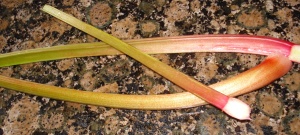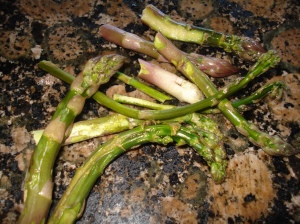Once you’re in the habit of eating seasonally, or of trying to, it’s easy to assume everybody does. And it’s easy to forget why you decided to, because, let’s face it, in the Western world, many many kinds of food are available year round, so it requires a conscious decision to eat seasonally. So why should you?
1) Economy. In-season food is cheaper than out of season food.
2) Availability. In-season food is more readily available than out of season food. (And the law of supply and demand implies lower cost).
3) Environmental concerns. In-season food tends to be sold relatively locally, so there’s less pressure on the transport system. (And fewer food miles leads to lower cost.) There’s also less need for artificial preservation, whether chemically or by simple refrigeration, again reducing stress on the environment.
4) Social concerns. Buying in-season food can help to support local (often small) producers. Sometimes this costs more money than buying mass-produced food from a chain store, but not always, especially because of reasons 2 and 3 above.
5) Variety. Eating seasonally automatically promotes a varied diet over the course of the year. By their nature, local, in-season green beans aren’t available in the winter here in the UK, while local parsnips aren’t available in summer.
5b) Variety. In the main producing season, you will be spoiled for choice among the many different kinds of in-season vegetables and fruits on offer. In contrast, in the less productive season, the in-season choice is more limited. This has been true in all the places I have lived, in North America and in Europe.
5c) Variety. In-season foods usually come in more than one variety themselves, so in the main producing season you actually can have variety within lettuces, between strawberries, among beans, etc etc. In the less productive season, you will see variety between cabbages and between broccoli, among potatoes, within apples and other ‘winter’ products.
6) Taste. If in-season means local, local means fresh, and fresh means harvesting can take place closer to peak ripeness. This in turn means maximum flavour and dietary value.
Here are a few things that are in season RIGHT NOW, in my garden:
- Rhubarb
- Spinach
- Asparagus
I am a convert to eating seasonally. What about you?













I try to eat as much seasonal produce as possible but not exclusively.
By eating seasonally you really value and appreciate the various produce. We have an avocado tree which produces an enormous amount of fruit from about May to December and some years as late as the end of February. I can assure you that by the end I am actually sick of them! I never, ever buy avocadoes when ours is not fruiting – makes the new season crop so special. Blueberries and mangoes are other things that we/our neighbours grow and I apply the same logic.
One thing I refuse to buy are imported North American cherries in July – that is our winter – it is just wrong n every level!
LikeLiked by 1 person
Exactly! My personal purchasing rule is that if it _can_ grow locally, I don’t buy it imported. You may have noted that we grow quite a few things, too, some of which are prolific enough that I simply never buy them, like runner beans. And yes, I get heartily tired of beans by the end of summer, but am always anxious for the new crop the next year. 🙂
LikeLike
[…] country I live in, because I believe that local means fresh, and fresh means better taste, among other reasons. But that doesn’t mean I won’t use or eat it, especially if the alternative is that it […]
LikeLike